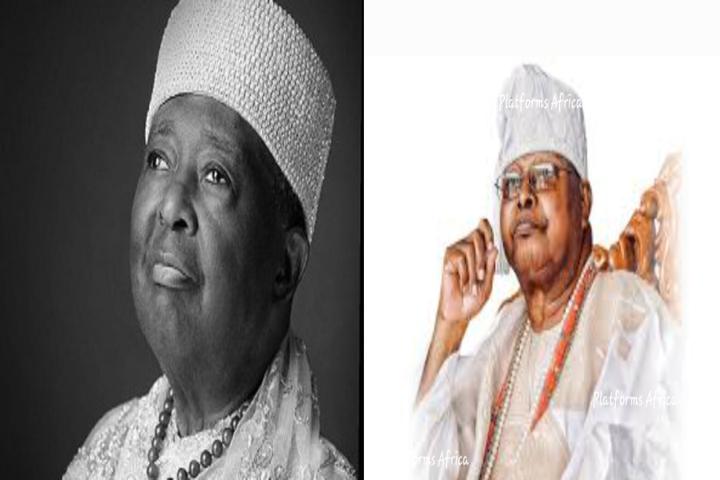The role of the Ooni of Ife, Oba Okunade Sijuade, in the aftermath of the annulment of the 1993 presidential election is widely considered less than noble.
In Awujale, the recently released autobiography of Oba Sikiru Adetona, the Awujale of Ijebuland, Sijuade’s connivance with those who annulled the election is brought into sharp focus.
His position as the most revered traditional ruler in Yorubaland did not inoculate Oba Okunade Sijuade Olubuse II, the Ooni of Ife, from public scorn. Since 1993, much of the mystique around him has been eroded, largely through the controversy sparked by the annulment of the June 12, 1993, presidential election. The annulment inflicted grave reputational injuries on Oba Sijuade—injuries from which, according to Adetona, he may never recover, especially now that the Awujale has chosen to revisit his role in one of the darkest chapters of Yoruba and Nigerian history.

The medium chosen by Oba Adetona is his autobiography, Awujale, where Chapter 11 is devoted to the annulment and the struggle for de-annulment of the election won by the late Chief M.K.O. Abiola.
The Ooni in the Spotlight
In Awujale, Adetona offers more than a worm’s-eye view. He presents a detailed account in which the Ooni of Ife does not come out smelling of roses. As one of the most prominent Yoruba monarchs, Adetona was regularly invited to meetings with General Ibrahim Babangida (IBB), the military ruler who annulled the election and installed an Interim National Government (ING) headed by Chief Ernest Shonekan.
As the anger provoked by the annulment raged across Nigeria—particularly in the South-West, which felt most aggrieved—IBB sought to limit the damage by engaging traditional rulers and leaders from different regions.
Adetona narrates that ahead of one such meeting in Abuja, he suggested to the Alaafin of Oyo, Oba Lamidi Adeyemi, the need for Yoruba monarchs to adopt a common position before meeting Babangida. Though initially hesitant due to rivalry with the Ooni, the Alaafin eventually agreed. The Oba of Lagos, Oba Adeyinka Oyekan, was also consulted. He supported the idea but refused to accompany them to the Ooni’s suite.
When Adetona and Adeyemi eventually met Sijuade, they found him dining with Alhaji Ado Bayero, the Emir of Kano. After the meal, the Ooni joined them. To their dismay, he appeared to have already aligned himself with northern traditional rulers who were pushing for a fresh Council of State meeting rather than the outright validation of Abiola’s mandate.
Yoruba Position vs. Northern Position
Adetona recalls that their mandate from the Yoruba people was clear: the election had been concluded and Abiola had won. Therefore, only the official declaration of the results would satisfy the Yoruba. The Ooni, however, presented a position that diluted this demand, aligning more closely with the northern rulers’ call for a fresh Council of State meeting.
Although he eventually appeared to agree with Adetona and the Alaafin’s insistence on the Yoruba mandate, suspicions lingered. So much so that Yoruba monarchs planned to “hem” the Ooni between two rulers during the Abuja meeting to prevent him from wavering.
That plan collapsed when the seating arrangement was pre-assigned.
Babangida’s Meeting and the Ooni’s Shift
At the meeting, after IBB explained the government’s position, the first speaker, Sultan Ibrahim Dasuki of Sokoto, condemned the annulment. When it was the Ooni’s turn, to everyone’s shock, he presented the Yoruba monarchs’ position—demanding Abiola’s declaration as president-elect. The room fell silent, Adetona recalls.
However, what followed exposed Sijuade’s inconsistency. After Babangida revealed that his government had settled about $600 million in debts owed to Abiola, Adetona claims the Ooni became visibly agitated and made an indiscreet remark that betrayed his shift. Later, to Adetona’s astonishment, the Ooni told journalists that he supported Babangida’s call for a fresh election—contradicting the Yoruba mandate.
The Yoruba monarchs were stunned. A reporter later replayed a tape of the Ooni’s interview for Adetona and the Alaafin, confirming the betrayal. Faced with evidence, Sijuade was pressured to grant another interview, this time restating the Yoruba position. While newspapers carried the corrected version, the Nigerian Television Authority (NTA) had already broadcast the Ooni’s earlier, compromising statement nationwide.
Adetona on Obasanjo
In the same book, Adetona does not spare Chief Olusegun Obasanjo, describing him as a “Judas who would betray his people,” who squandered the enormous goodwill he carried into office. He recalled telling Obasanjo directly during a private ride in 2002 that the trust he once had in him was gone.
Adetona further criticised Obasanjo’s presidency as wasted years, stating that eight years was enough to have fixed electricity, confronted corruption decisively, and entrenched order and the rule of law—yet little was achieved.
Conclusion
Through his autobiography, the Awujale has rekindled debate over June 12, 1993, and the roles played by key Yoruba monarchs and political leaders. His blunt account of the Ooni’s wavering position and his damning verdict on Obasanjo offer a rare insider’s perspective into Nigeria’s political betrayals—reminders of how history continues to shape present perceptions of leadership and loyalty in the country.
Credit: Omoola Institute Of African Culture.’s post on Facebook
Support InfoStride News' Credible Journalism: Only credible journalism can guarantee a fair, accountable and transparent society, including democracy and government. It involves a lot of efforts and money. We need your support. Click here to Donate
